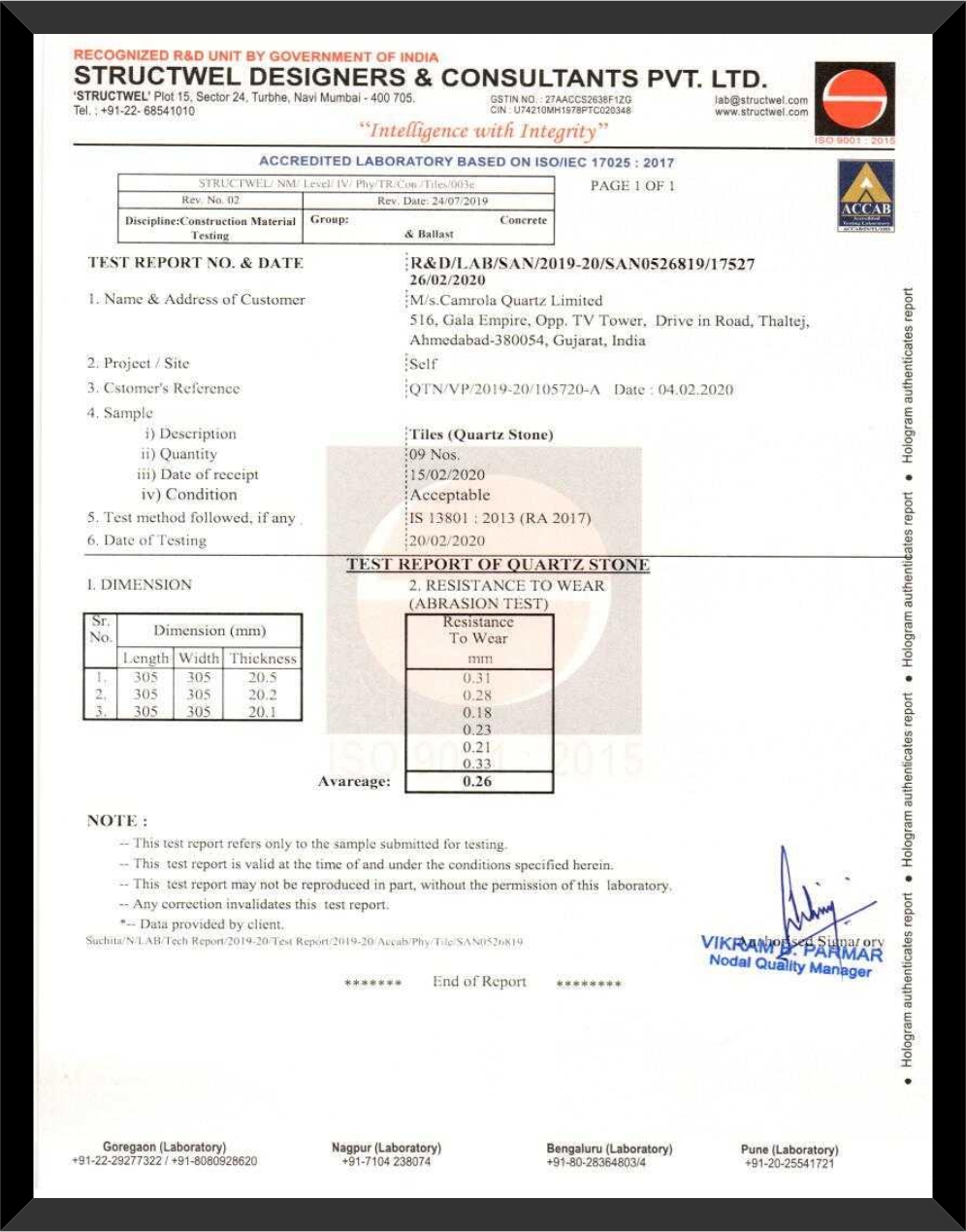Mail Us
Technical Specification
| 01 | Specific Weight | kg/dm3 | 2.35 - 2.45 |
|---|---|---|---|
| 02 | Water absorption (by weight) | % | <0.1 |
| 03 | Module of rupture | MPa | 36 - 65 |
| 04 | Compressive strength | MPa | 150 - 240 |
| 05 | Mohs hardness | grade | 6 -7 |
| 06 | Deep abrasion resistance | MM3 | ≤300 |
| 07 | Falling ball impact | 1000g ≥ 400 mm - 450g ≥ 800 mm | |
| 08 | Expansion coefficient | mm/oC | ≤ 3.5*105 |
| 09 | Temperature coefficent | - | 180oC environment resistance 24 hours |
| 10 | Dimensional stability | - | Class A |
| 11 | Surface slip resistance | - | Honed 400 polished |
| 12 | Acid chemical resistance | - | Resist |
| 13 | Suitability for kitchens | - | Suitable |
Why Us?
- 1 in performance among countertop surfaces
- Versatile, Consistent and Elegant Colors
- Creative Innovation
- Premium Quality
- Maintenance Free
- Easy to clean and maintain
- High degree of scratch and stain resistance
- Impervious to bacteria and microorganisms
- Homogenous pattern finish and performance (e.g. shading & mechanical properties)
- Very long lasting and heat resistant due to high mineral content (~92%). Due to its high content of siliceous minerals, Quartz has a very high Mohs hardness (6‐7), giving it better resistance to impact (denting/chipping), abrasion, buckling, vibrations and handling versus natural stone under normal use and proper maintenance
- Eco friendly
Test Report


Care & Maintainance
Quartz countertops are extremely resilient. Routine care and cleaning is very simple, and with basic precautions to prevent stains, dents or scratches, quartz countertops can lend beauty and a sense of permanence to a home for decades.
Routine Care & Cleaning
Quartz can be cleaned easily with a mild detergent, water and a soft cloth or paper towel, then rinse and dry thoroughly. Abrasive cleansers or harsh scouring pads and cleansers that contain bleach should not be used with quartz. Engineered stone surfaces do not require polishing to keep them shiny and smooth, but they should be cleaned gently to maintain their distinctive shine. Some quartz colors and finishes liked honed, matte, etc., are more sensitive to grease or finger-prints and may require extra care during routine cleaning.
Avoid using metal knives and utensils directly on the countertop, as metal may scratch the quartz. When chopping vegetables, slicing bread or preparing other foods with sharp utensils, use a cutting board to prevent scratches.
To remove grease from your quartz countertops, use a product recommended for stone care. Harsh cleansers should not be used to remove grease or other cooking stains. Gently scrape away hardened grease with a plastic knife
before applying cleanser.
Stains & Scratches
For stubborn or dried spills, use a nonabrasive cleaning pad such as a white 3M Scotch-Brite® scrub pad combined with a small amount of mild soap or specialized stone cleaner.
While quartz countertops are resistant to scratches, scuffs, dents, stains and burns, these surfaces are not damage-proof. Homeowners must take care to avoid exposing quartz countertops to permanent inks, markers or dyes, as these substances may not be removable. If a countertop is marked by a permanent marker or dye, rinse the area with water as soon as possible, then apply a cleansing product approved for stone care if the stain is still visible. Clean the area again with water after applying the cleanser.
Although quartz is resistant to stains from juice, wine, coffee and other food substances, it is best to wipe up spills immediately to prevent possible stains. Do not use metal utensils or knives directly on the quartz surface.
Certifications & Specs






